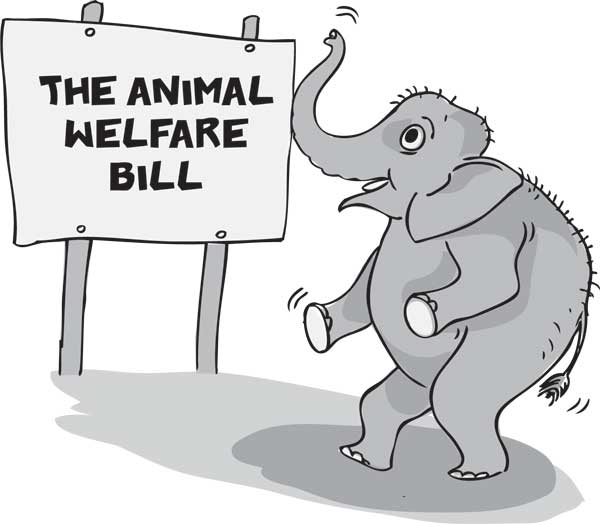Daily Mirror- EDITORIAL 2016-02-27

Amid the growing incidence of cruelty to animals including the latest multi-million rupee rackets on the capture of a baby elephant, the cabinet has approved the long-delayed Animal Welfare Bill and sent it to the Legal Draftsman’s Department to include the provisions proposed by animal welfare movements also.
As for the existing laws against cruelty to animals, the last amendments were made in 1955. The prevention of cruelty to animals Ordinance -- under which the welfare of animals is taken into consideration -- is more than a hundred years old.The Animal Welfare Coalition of Sri Lanka (AWCSL) and other civil society movements working on animal welfare have highlighted the need for major reforms to this law.
Earlier, a Bill for this purpose was presented to Parliament in October 2010 by the Ven. Athuruliye Rathana Thera. This legislation underlined the duty for persons in charge of animals to treat them (the animals) humanely, to prevent cruelty to animals, to secure the protection and welfare of animals, to establish a National Animal Welfare Authority which would implement regulations and codes of practice to raise awareness on animal welfare.As for the existing laws against cruelty to animals, the last amendments were made in 1955. The prevention of cruelty to animals Ordinance -- under which the welfare of animals is taken into consideration -- is more than a hundred years old.The Animal Welfare Coalition of Sri Lanka (AWCSL) and other civil society movements working on animal welfare have highlighted the need for major reforms to this law.
The AWASL has welcomed the new Bill as a positive move towards creating a better environment where animals are not subjected to cruelty. The Coalition says it will closely monitor the implementation of the new laws.In this context, we also need to reflect on some issues brought up by the movement the Dharma Voices for Animal (DVA). It says that as human being we all should join in opposing cruelty to animals, because this planet belongs to all living creatures not only to us.
The DVA, after years of research and scientific investigations, explain why meat and meat products are unhealthy. It says there is no doubt that eating meat is bad for our health. Diseases more common among meat eaters include anaemia, appendicitis, arthritis, breast cancer, cancer of the colon, cancer of the prostate, constipation, diabetes, gall stones, gout, high blood pressure, indigestion, obesity, piles, strokes and varicose veins. It is a shame and a sign of ignorance that most people still don’t know about these dangers.
A leading author T. Colin Campbell PhD. says excessive animal protein could cause the growth of cancer. In multiple, peer-reviewed animal studies, researchers discovered that they could actually turn the growth of cancer cells on and off by raising and lowering doses of animal protein. The huge population studies called “The China Study” showed correlations between amount of animal products eaten and the number of cases of cancers, heart disease and other serious health conditions.
A lessons from ‘The China Study’ is that breast cancer is associated with consumption of animal fat, but not plant fat. Heart disease is associated with eating animal protein. When we stop eating it -- most heart diseases are gradually healed, type 2 diabetes is associated with increased fat intake. Colon cancer is associated with meat consumption.
Kidney stones are also associated with animal protein intake. Macular degeneration and cataracts occur through lack of eating highly coloured fruits or vegetables, the author says.Cognitive impairment, memory loss, Alzheimer’s disease are also associated with an animal-based diet.The message is simple: Eat plants for health. “People who ate the most animal-based foods got the most chronic diseases. People who ate the most plant-based foods were the healthiest.” Heart disease can be reversed through nutrition says Caldwell B. Esselstyn M.D., a physician and researcher at the best cardiac centre in the United States.
With a whole foods, plant-based diet, not only did it stop the progression of the disease, but 70 percent of patients saw an opening of their clogged arteries. It’s not just cancer and heart disease that respond to a whole foods, plant-based diet. It may also help protect us from diabetes, obesity, autoimmune diseases, bone, kidney, eye, and brain diseases, the specialist says. Gradually the people of Sri Lanka need to reconsider not only whether it is good but also whether it is right for us to carry out mass-scale slaughter of cattle, goats, pigs, chickens and other creatures.
No comments:
Post a Comment